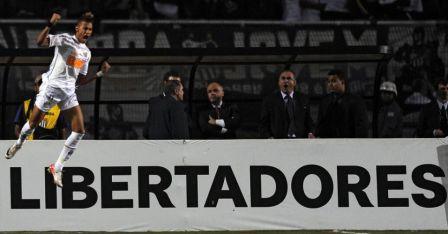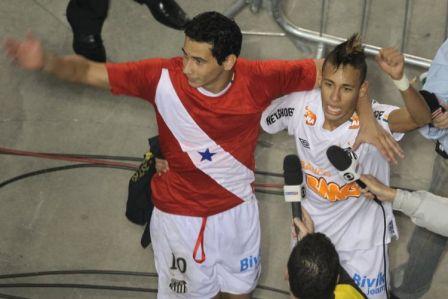Tempo de leitura: menos de 1 minuto
Sports Illustrated
SAO PAULO (AP) — Brazilian club Santos [A equipe brasileira do Santos] won [ganhou; venceu] the Copa Libertadores for the first time [pela primeira vez] since the Pele era [desde a era Pelé], beating [derrotando] Uruguay’s Penarol 2-1 [o Peñarol do Uruguai por 2 a 1] in the second leg [na segunda partida; na partida de volta] of the final Wednesday before postgame celebrations [antes de as comemorações após o jogo] were marred [serem manchadas; serem maculadas] by a brawl [briga; confusão] between the two sets of players [os jogadores dos dois times].
Santos won 2-1 on aggregate [na soma dos resultados] after the first leg [a partida de ida; o primeiro jogo da final] had ended scoreless [zero a zero] in Montevideo.
Neymar put Santos ahead [colocou o Santos em vantagem] in the 47th minute [aos 2 minutos do segundo tempo] and Danilo made it 2-0 in the 69th [aos 24 do segundo tempo] before an own goal [gol contra] in the 80th [aos 35 (do segundo tempo)] brought Penarol back into the contest [colocar o Peñarol de novo no jogo; dar esperanças ao Peñarol novamente].
Foto: Vanderlei Almeida/AFP
A brawl started after the match [depois do jogo] as Santos celebrated [enquanto o Santos comemorava], with Penarol players going after [perseguindo; partindo pra cima (inf.)] the Brazilians and both sides [os dois times] exchanging punches and kicks [trocando socos e pontapés] until police came in to intervene.
“A (Santos) fan [torcedor] entered the field and provoked us,” Penarol forward [atacante] Alejandro Martinuccio said. “They have to learn how to celebrate [Eles têm de aprender a comemorar], we had accepted the loss [a derrota].”
A couple of [Uns dois ou três] Santos players were hit [foram atingidos] and stayed on the ground [ficaram estirados no chão] after the fight, but none [nenhum deles; ninguém] were seriously injured [ficou gravemente ferido]. Penarol players later calmed down [se acalmaram depois] and came back [voltaram] to receive their runner-up medals [suas medalhas de vice-campeão].
“They were a worthy opponent [Eles foram adversários difíceis], but they don’t know how to lose [mas não sabem perder],” Santos defender [zagueiro] Leo said.
Santos took its third title [conquistou seu terceiro título] in Latin America’s biggest club competition [do maior torneio de clubes da América Latina], having won [tendo vencido] back to back titles [títulos consecutivos] in 1962 and 1963 when a young Pele led the attack [comandava o ataque].
Now the star was Neymar, touted [alardeado] as a future star [futuro astro] of Brazil’s national team [seleção brasileira].
“It’s the happiest day of my life [É o dia mais feliz da minha vida], I made history [fiz história],” Neymar said. “We deserved [Merecemos] this title, it’s time to celebrate [agora é hora de comemorar].”
Neymar kneeled down [se ajoelhou] a few moments [um pouco] after the final whistle [o apito final] and sobbed [chorou (de soluçar)] with his hands covering his face [cobrindo o rosto]. Pele also cried on the field [em campo] after the match was over [depois do jogo].
“We have to thank these young guys for giving us this title,” Pele said.
Penarol fell short in its bid to win [chegou perto de conquistar; ficou próximo de vencer] its first Copa Libertadores title in 24 years, which would have brought it level [que o faria empatar em número de títulos] with Argentina’s Boca Juniors on six championships [campeonatos]. Independiente of Argentina holds the most [é o maior vencedor], with seven.
The victory makes Santos the most successful [o maior vencedor; o mais bem sucedido (lit.)] Brazilian team [clube brasileiro] in the Copa Libertadores, tied with [empatado com] Sao Paulo with three titles. It also gives the club a spot [também garante ao clube uma vaga] in FIFA’s World Club Championship [Mundial Interclubes da FIFA] later in the year [no fim do ano].
With Pele watching from the stands [assistindo da arquibancada], Neymar opened the scoring [abriu o placar] with a firm low shot [um arremate firme e rasteiro] into the near corner [no canto do goleiro], using the side of his right foot [batendo de chapa] to get the ball past [sem chances para o] Penarol goalkeeper [goleiro] Sebastian Sosa. Paulo Henrique Ganso, back from injury [voltando de lesão] after more than a month sidelined [que o afastou (dos gramados) por mais de um mês], started the play [começou a jogada] with a nifty back-heel pass [um belo passe de calcanhar] to Arouca, who then found [que tocou para] Neymar on the left side [no lado esquerdo] of the penalty box [da grande área].
Cf. Expressões Idiomáticas: SIDELINE
“Allowing the goal [Tomar o gol] early in the second half [no começo do segundo tempo] was what killed us,” Penarol forward [atacante] Alejandro Martinuccio said.
It was the sixth Copa Libertadores goal for Neymar [Foi o sexto gol de Neymar na Libertadores], the 19-year-old Brazil striker [artilheiro] with a Mohawk hairdo [corte de cabelo (estilo) moicano] who is likely to leave the club soon [que, provavelmente, deverá deixar o clube em breve], as [porque] many of Europe’s biggest clubs [muitos dos maiores clubes europeus] are preparing giant transfer offers [propostas milionárias].
Right back [O lateral direito] Danilo added to the lead [ampliou a vantagem] after a pass [depois de receber um passe] from Elano in a breakaway [em um contra-ataque], dribbling past [driblando] a defender and firing a low shot across the area into Sosa’s corner [dando um chute rasteiro cruzado no canto].
Penarol pulled one closer [diminuiu] when Santos defender Durval found his own net [marcou um gol contra] after a cross [um cruzamento] by Fabian Estoyanoff, who had just entered the match [que havia acabado de entrar]. But Santos managed to defend its lead [conseguiu sustentar a vantagem] without allowing many dangerous chances to Penarol [sem deixar que o Peñarol criasse jogadas perigosas].
“It’s an important title for the club and for all the players,” Santos captain Edu Dracena said. “We’ve been trying to win this third title for a long time and now we’ve made history.”
This Santos team was able to go one better [ir um passo além; ir mais longe] than its 2003 predecessor, which lost the final to Boca Juniors despite boasting the likes of [apesar de contar com jogadores do calibre de] striker Robinho and playmaker [armador] Diego.
It is the first Libertadores title for Santos coach [treinador] Muricy Ramalho, who had lost [que havia perdido] in the final in 2006 with Sao Paulo and in 2008 with Fluminense. Ramalho’s teams have won four of the past five [ganharam quatro dos últimos cinco] Brazilian league titles [campeonatos brasileiros], but he had been better known [era mais conhecido] for his near failures [por seus fracassos] in the South American competition.
“I’ve been going after this for a long time [Fazia tempo que eu vinha buscando esse (título)],” Ramalho said. “It wasn’t easy, but it’s finally my turn [mas finalmente chegou a minha vez].
”Santos became the team to beat [se tornou o time a ser batido] after the emergence [surgimento] of teenagers [jovens; adolescentes (lit.)] Neymar and Ganso, who are touted as future stars of the national team when it hosts [(o Brasil) sediar] the 2014 World Cup.
While Neymar was key [essencial; determinante] for Santos throughout [durante toda a] the Copa Libertadores, Ganso only returned to the team [só voltou ao time] in Wednesday’s final [na final de quarta-feira] after more than a month sideline because of a right thigh muscle injury [lesão muscular na coxa direita].
Foto: Rivaldo Gomes/Folhapress
Santos’ first title [O primeiro título do Santos] in 1962 also came [também foi conquistado] in a final against Penarol, with Pele scoring twice [marcando duas vezes]. Penarol won the first two Copa Libertadores in 1960 and 61′ and then added titles [e depois ganhou os títulos] in ’66, ’82 and ’87.
But after that last title, Penarol didn’t play a significant role [não vinha tendo um papel de destaque] in continental football [nos torneios continentais] until the team’s impressive campaign [até a impressionante campanha da equipe] this year, when it eliminated strong teams [times fortes] like Velez Sarsfield of Argentina, Universidad Catolica of Chile and defending Copa Libertadores champion [e o então campeão da última Libertadores] Internacional of Brazil.
Playing at a Pacaembu Stadium packed with nearly 40,000 supporters [em um estádio do Pacaembu lotado com quase 40 mil torcedores], Santos tried to pressure from the start [tentou pressionar desde o início da partida], but Penarol was able to control the Brazilians’ attacking thrusts [investidas ofensivas].
Still [Ainda assim], Santos had some of the best chances [teve algumas das melhores oportunidades] in the first half [no primeiro tempo]. A free kick [falta; tiro livre (lit.)] by Elano was barely saved [deu trabalho] by Penarol goalkeeper Sebastian Sosa in the 32nd, and then [depois] defender Leo’s close-range shot [oportunidade clara; arremate na cara do gol] went just wide [passou raspando] in the 44th. It also came close [O Santos quase marcou novamente] with headers [cabeçadas] by Durval in the fourth and 45th minutes.
Penarol had a couple of [algumas; duas ou três] opportunities, with Argentine midfielder [meio-campista] Alejandro Martinuccio failing to control [que não conseguiu dominar a bola] a ball inside the area in the 12th for what could have been an easy goal [naquilo que poderia ter sido uma chance para marcar com tranquilidade], then firing narrowly wide [arrematando para fora] with a left-footed shot [de esquerda] from outside the box [de fora da área] in the 27th.
Penarol lost defender Alejandro Gonzalez to injury [ficou sem o zagueiro Alejandro Gonzalez por conta de uma contusão] in the 38th after a hard foul [falta dura] by Neymar.
Lineups [Escalações]:
Santos: Rafael, Danilo, Edu Dracena, Durval, Leo (Alex Sandro, 68), Arouca, Adriano, Elano, Paulo Henrique Ganso (Para, 86), Neymar, Ze Eduardo.
Penarol: Sebastian Sosa, Alejandro Gonzalez (Emiliano Albin, 38) (Fabian Estoyanoff, 79), Carlos Valdez, Guillermo Rodriguez, Dario Rodriguez, Matias Corujo, Nicolas Freitas, Luis Aguiar, Matias Mier (Urretaviscaya da Luz, 64), Alejandro Martinuccio, Juan Manuel Olivera.
Referee [Árbitro]: Sergio Pezzotta (Argentina).
Aprendeu alguma palavra ou expressão nova? Quais? Gostou do texto? Envie sugestões, críticas e comentários abaixo. Obrigado.



Oi, Ulisses!
Estou sempre por aqui nesse super blog e tenho aprendido muito.
Show de bola, rsrsrs… esse texto mastigadaço. Certamente, muitos desfrutaram como eu de ampliar o vocabulário, aprendendo novos termos.
Uma curiosidade bem como dúvida também. Neste trecho do texto a baixo:
A couple of [Uns dois ou três] Santos players were hit [foram atingidos] and stayed on the ground [ficaram estirados no chão] after the fight, but none [nenhum deles; ninguém] were seriously injured [ficou gravemente ferido]. Penarol players later calmed down [se acalmaram depois] and came back [voltaram] to receive their runner-up medals [suas medalhas de vice-campeão].
Quando diz: “none were…” Não era para ser none was…? Fiquei na dúvida!
Abração!
Gustavo,
Tudo bem? Obrigado pelo elogio ao Tecla SAP. Digite “none” em http://www.onelook.com, clique no link do “American Heritage Dictionary of the English Language” e veja a explicação no rodapé da página em “Usage Note”.
Abraços a todos
Oi, Ulisses!
Tudo joia graças a Deus.
Hei de checar o link sugerido, sim.
Obrigado e ótimo final de semana.
Abração!
Muito bom Ulisses!! Gostei da reportagem, como disseram ai em cima, foi rápido einh? Aprendi muitas expressões relacionadas ao futebol…vlw
Julio,
Valeu! As they say, you’ve got to strike while the iron is hot! 😉
Abraços a todos
Achei interessantes as traduções:”the shot went just wide”(passou raspando), em contraste com “…then firing narrowly wide” (arrematando para fora).Acho que nesse último caso talvez devesse ser acrescentado algo como “mas passando perto” ou “quase entrando” ou mesmo “raspando”. Abs
Carlos,
Obrigado pelo feedback. Você tem razão na sua observação. Acho que deixei o observador tomar o lugar do tradutor. Esse chute não passou tão perto assim como o autor do texto o descreveu… 😉
Abraços a todos
Adorei o texto Ulisses! Como você foi rápido ao reportar esse assunto!! Aprendi muuuuuuitas expressões novas! Muito Obrigada! E viva o Santos!
Jane,
Obrigado pelo comentário. Volte sempre!
Abraços a todos
Great way of teaching English through collocations. Keep it up!
Oto,
Obrigado pelo interesse no Tecla SAP e pelo comentário também. Com o feedback positivo dos leitores, fica mais fácil trabalhar! 😉 Valeu!
Abraços a todos